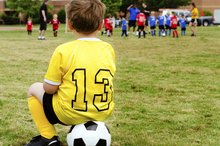Should You Push Your Children Into Sports?
Many parents wonder whether they should encourage their children to play sports. It is known that athletic participation aids in fighting childhood obesity, encourages social interaction and promotes self-confidence and independence in many children. Pushing reticent children into sports, however, can have adverse consequences, because competition can place too much pressure to succeed on even recreational athletes. Parents must weigh the pros and cons of involving their children in youth sports.
Choosing a Sport
The word "push" implies a measure of force. Children should not be forced to play sports, Blake Soto writes in the "Youth Fitness" magazine, as this can ruin the experience of participation 14. A child who is adamantly opposed to competing may rebel, and will probably hate the sport he was "pushed into." Encouraging a child to try his hand at a particular game is a much better strategy. Consider his natural inclinations and match these to the type of sport he is most likely to enjoy. For example, if your child loves interacting with nature, encourage him to participate in cross country running or competitive fishing. Likewise, if your child is always turning cartwheels and doing handstands, you might want to steer her toward a gymnastics group. Attune yourself to your child's interests, and don't sign him up for baseball if the only reason is that you played Little League as a child. Your kid is likely to enjoy a sport more if it suits his particular abilities. If your child is drawn to arts or music rather than sports, accept this and do not insist she participate in athletic competitions.
- The word "push" implies a measure of force.
- Attune yourself to your child's interests, and don't sign him up for baseball if the only reason is that you played Little League as a child.
Benefits of Participating
Psychological Effects of Sports on Children and Youth
Learn More
The physical exertion involves in sports can straighten muscles, increase flexibility, rev up metabolism, improve circulation and promote good mental health. Sports also give kids a chance to develop valuable social skills, notes the American Academy of Pediatrics 2. A child learns much from competing, including how to cope with both victory and failure. Athletic accomplishment yields confidence and assurance for growing children. Sports, in general and handled well by parents in particular, are incredibly beneficial for children in terms of body, mind and spirit.
- The physical exertion involves in sports can straighten muscles, increase flexibility, rev up metabolism, improve circulation and promote good mental health.
- Sports also give kids a chance to develop valuable social skills, notes the American Academy of Pediatrics 2.
Potential Problems
While sports provide excellent physical and mental growth opportunities for children, "pushing" a child too hard into athletics might result in very negative results. Serious injuries can occur to growing bodies if a parent encourages his children to train too heavily, Soto cautions in "Youth Fitness." Children placed in strenuous activities at an early age often develop physical problems, such as tendinitis, that can haunt them their entire lives. It's also possible to push children beyond their mental capacities during competition. "Star" players might become arrogant and belligerent or falsely believe their accomplishments on the field outweigh every other aspect of their lives. The limelight can burn too brightly for these athletic kids, Soto warns. "Burnout," in which the child becomes anxious, stressed or extremely bored with a sport, can happen when parents place too mush emphasis on athletics.
- While sports provide excellent physical and mental growth opportunities for children, "pushing" a child too hard into athletics might result in very negative results.
Modeling Good Sportsmanship
How to Deal With Your Kid's Bad Attitude in Sports
Learn More
Appropriate modeling by parents and coaching should occur when children are encouraged or "pushed" into sports. Parents and coaches must maintain good sportsmanship and make reasonable decisions when it comes to their athletic charges, Soto explains. Adults who react positively by applauding all children's efforts, encourage teamwork and friendship among competitors and keep their expectations realistic regarding a child's abilities are likely to have children who enjoy playing the sport and who are likely to enjoy all the benefits athletics provide.
Warning Signs
There are many warning signs that indicate a parent may be pushing her children too hard into sports. Parents can determine if a sport is too taxing on a kid when that child feigns illness to avoid athletic participation, complains about the sport being too difficult or behaves inappropriately during games. A drop in grades, fatigue and an obsessive focus on a particular sport or aspect of that sport can also indicate the child is suffering and needs a break from the rigors of athletics, Soto reports.
Related Articles
References
- American Academy of Pediatrics: Organized Sports for Children and Preadolescents
- Family Education: Encouraging Children to Join Sports
- Kidneys and sports. Patel DR - Adolesc Med Clin - 01-FEB-2005; 16(1): 111-9, xi
- Medical Conditions Affecting Sports Participation. PEDIATRICS Vol. 107 No. 5 May 2001, pp. 1205-1209.
- National Kidney Foundation. Living With One Kidney. Updated: 06/03/04.
Writer Bio
Lisa Mooney has been a professional writer for more than 18 years. She has worked with various clients including many Fortune 500 companies such as Pinkerton Inc. She has written for many publications including Woman's World, Boy's Life and Dark Horizons. Mooney holds bachelor's degrees in both English and biology from the University of North Carolina at Charlotte.









